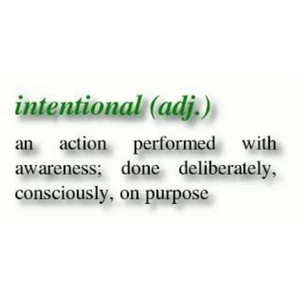‘What I really love about Intentional Living is that it causes you to start. It doesn’t allow good intentions to stay as merely intentions. It says you’ve got to turn those into good actions.’ – John C Maxwell
Most of us have been guilty of thinking dreamily about the future – you know ‘that day’, the one when we buy the dream house; take that overseas holiday; finally get to work on something that we love or be in a position to really influence and add value to others. Or maybe we’ve heard it uttered in the corridors by others ‘Some day I will earn enough to do X’ or ‘Some day I will step out and do X’. The reality is ‘some day’ never comes unless we focus on making it happen.
Things don’t just happen just because you think it. Success comes to those who are intentional. Regardless of whether you have landed your ideal role, changed career direction or simply bought your dream car, it has come about because there has been a purposeful decision made and action (often lots of it) taken to see it become a reality.
As leadership expert John Maxwell notes, you know when you are leading intentionally and on the road to success because it’s all uphill. That doesn’t mean the road is always fraught with obstacles or difficulties but rather it is one that requires consistent, deliberate and disciplined behaviours and choices. There’s no coasting to success. You can’t just hang around at the office for days or weeks on end and think ‘something good might happen to me today on this road to success’. If you wait around you coast and when you coast you go down hill never up.
As leaders, it is imperative that we are leading intentionally and not just talking about what we intend to do. That means leading firstly ourselves with purpose, clarity and confidence and then leading our people – and not just the outcomes. Failing to do so not only sees us risking disengagement, misalignment, conflict and productivity but also sees our own leadership credibility called into question. Nobody wants to work with or for somebody who is only full of great intentions, instead they want to work with and for people who know how to turn intent into action and in a way that has meaning to them.
So what are the habits and traits of leading with intent? I would encourage you to take a moment to reflect on the following 6 characteristics and how you might seek to embody them in your role as a leader
Intentional Leaders:
- Assume responsibility for who they are and where they are: Ultimately we are all responsible for the path we are on and where we are along that path. Leaders who assume personal accountability are much more likely to achieve success, unite teams or enact change if required.
- Are clear about their leadership purpose: They recognise what their core value is and know that it is more than a checklist of tasks to do today, next week or this financial year.
- Care about their people: They know what high impact looks and sounds like for the individuals on their team. They care enough to offer challenge, opportunity, growth and recognition; and will challenge behaviours and values that compromise the integrity of their team and what they are aiming to achieve.
- Challenge the status quo: Chase what could be and not merely what is. Fresh opportunity, increased productivity, relevance and fulfillment do not come from simply standing still or doing what we have always done but rather from seeking new and improved ways of doing things.
- Build trust: For leaders, trust is two fold. You need to be able to engender it and you need to be able to give it. Without both, success is almost always compromised.
- Celebrate the milestone achievements: Whilst leading with intention requires us to look over the horizon, it also means recognizing success along the way. Recognising that success is a series of building blocks is critical if we are to maintain purpose and momentum for what we do.
Living and leading intentionally doesn’t mean that we always have to be pushing, striving or seeking out the next big thing. Let’s face it; we would be exhausted if we did those things 24 hours a day, 7 days a week and 365 days a year. Sometimes taking time out to re-energise and re-engage needs to be an intentional act. What we do need to do is get crystal clear on what we want and why and to then start closing the gap between intent and action. It means being realistic about how we do it and what offers the most impact. To do this we need to know that our actions (and reactions) not only matter but also are what will be remembered.
As always I would love to hear your thoughts below.


